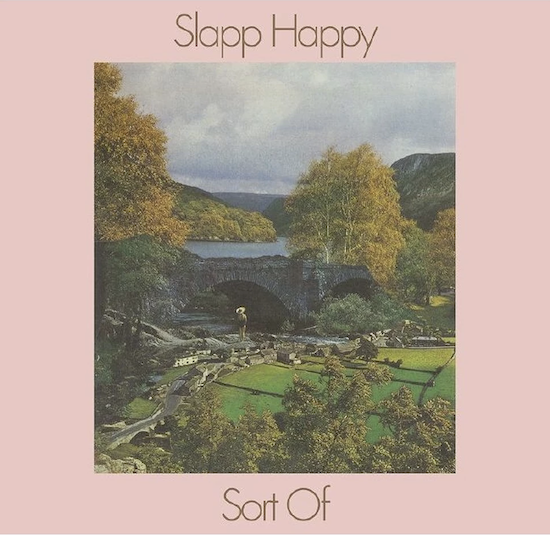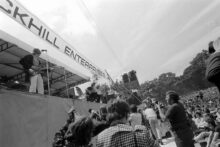The borders between what gets termed prog rock and post punk were far more porous and negligently policed than the conventional histories of either have tended to credit. How did John Lydon transform British music for a second time in two years? By walking backwards into his teenage loves of prog acts such as Van der Graaf Generator and Captain Beefheart. The Fall may have loudly scoffed at hippiedom, but they emerged from a Hawkwind-listening, spliff-smoking, psychedelic-gobbling counterculture in Prestwich that owed a lot to those ideals. By the early 1980s, their increasingly hypnotic and lysergic sound began to show it (“if we carry on like this,” half-jokes Smith in 1983’s ‘Words Of Expectation’, “we’re gonna end up like King Crimson.”) Killing Joke’s drummer Paul Ferguson has spoken about how King Crimson and Yes informed his playing, whilst Swell Maps were actively making prog influenced experimental music as Solihull teens in the pre-punk era. Likewise, the only real precedents to post punk guitarists as various as Vini Reilly and The Edge are the celestial sonic experiments of Robert Fripp in the early 1970s.
DJs and compilers have leaned towards focusing, understandably, on the clear influence that dub, funk and free jazz had on what became tagged as post punk. Earlier this year, though, Demon records released the outstanding corrective compiled by Steven Wilson, Intrigue: Progressive Sounds In UK Alternative Music 1979–89. Seemingly aimed at an imaginary fogeyish and arms-folded early 70s prog bore living rent free in Wilson’s head, across 58 tracks by artists including Wire, XTC, Ultravox, Kate Bush and Cocteau Twins, the compilation painstakingly evidences how the ambitious and conceptual spirit of early 1970s prog quite obviously flourished on the other side of punk’s supposed hard border. At what point in the future might these genre distinctions about similar musicians making similar music in a similar geographic space fall away as historical signifiers?
Few acts make a mockery of any border between prog and post punk quite as thoroughly as Slapp Happy. The union of Peter Blegvad, Anthony Moore and Dagmar Krause may have been short and commercially unsuccessful, but would mint an important and overlooked union between British and West German underground scenes whilst pioneering a playful and experimental sound that still has resonances in British music half a century later.
In the mid 1960s, so concerned were the Danish-American Blegvad family by the US’ nightmare political mood following the Kennedy assassination and the escalating Vietnam conflict that they upped sticks from prosperous mid-century Connecticut and relocated to sleepy Hertfordshire. It was there, at the fee-paying St Christopher School in Letchworth, that Peter Blegvad formed a band with aspiring musicians Anthony Moore and Neil Murray (who doesn’t appear again in this story but would later play bass for Whitesnake and Black Sabbath.) The teenage band, variously named things like Slap Happy and the Dum-Dums, went their separate ways as teenage bands tend to do. After a stint at a British art school, Anthony Moore moved to Hamburg in 1970. On arriving, two people would change the course of his creative life. One was Dagmar Krause, a Hamburg native who had already been a member of early alternative folk act The City Preachers and recorded the excellent psychedelic avant-rock album I.D. Company in 1970 with vocalist Inga Rumpf. Krause and Moore quickly became an item.
The other was Uwe Nettelbeck, a German leftist intellectual and critic who had begun acting as a middle-man between label PolyGram and the West German avant-garde. Nettelbeck had effectively assembled the membership of Faust and, admirably, convinced the label to finance a new studio for the group in a former schoolhouse in the village of Wümme on the outskirts of Bremen. Meeting Nettelbeck was fortuitous timing. Moore was developing a fierce interest in tape machine experiments, influenced by European avant-garde composers like Stockhausen and Pierre Schaeffer but also English pop experimentalists such as George Martin and Joe Meek. Through Nettelbeck, Polygram recorded three albums of Moore’s work – 1971’s Pieces From The Cloudland Ballroom and the 1972 releases Secrets Of The Blue Bag and Reed Whistle And Sticks. “It was enough for PolyGram to throw up their hands in despair,” remembered Moore in a 2022 interview with Perfect Sound Forever website, “at that point, Uwe asked me if I couldn’t possibly make something a little more listenable.”
He phoned up his old friend Peter Blegvad, who was bored, lonely and studying in Exeter. Of course he wanted to get on the next plane to make an experimental rock album. His arrival at Wümme minted the three-piece act that would adopt the name of Peter and Anthony’s old school band. “Peter, Dagmar and myself were offered the use of the studio and as we were just a trio,” writes Blegvad in the liner notes to the new reissue, “it seemed a natural choice to ask Faust to become our rhythm section.” Jean-Hervé Péron, the bass player, Gunther Wüsthof, the keyboard and sax player, and Zappi Diermaier, the drummer, became, in effect, Slapp Happy’s rhythm section. Work on the project took place across May and June 1972 – just weeks after the recording of Faust’s second album So Far at the Wümme studio.
“Anthony and I were still treating it as a bit of a joke, defensively in part, lest we make fools of ourselves,” explains Blegvad in the liner notes, “but what happens when you’re working with friends and trying to amuse them, to make them laugh with your contributions? That was the criterion: if an idea – lyrical or musical – made us laugh, we’d try it.” This infused the album with an eccentric and pop spirit quite apart from what Faust had been used to. Once recording began, Dagmar Krause was encouraged by Nettelbeck to record vocals on the bulk of the tracks, as Nettelbeck grew weary of Blegvad and Moore’s public schoolboy japes.
“The guys were not serious about singing at the time,” remembered Krause in a 2016 Wire interview, “or they didn’t take themselves seriously and they were making endless takes of giggling and fun, and Uwe was not going to have it.”
The value of this decision is proved on opening track ‘Just A Conversation’, the album’s sole single. Blegvad had written little more than a single Dylanesque verse rhyming “conversation” with “Grand Central Station,” but a studio improvisation with the Faust players suddenly bulked it up into a chiming folk rock workout. Improvised garbled conversation is audible in left and right audio channels – seemingly to emphasise the song’s theme of conversation – providing the song with a mood of eccentricity that the band would sustain across the album.
Sort Of’s default setting is a pop Beefheart sketch. Sometimes this is vastly improved by ebullient and chaotic free jazz sax, as on ‘Paradise Express’, and sometimes not, as on the slight ‘Tutankhamun’. The seven-minute ‘Mono Plane’ is a masterpiece of this, though, where Faust’s rhythm section elevates the song far beyond its obvious debt to Beefheart’s ‘Mirror Man’ and into slamming, vice-tight avant-funk.
Faust had sounded primitivist and hypnotic like the Velvet Underground before – not least on their recently recorded ‘It’s A Rainy Day, Sunshine Girl’ – but never the prettier and more melodic version of the group. ‘Blue Flower’, sung by Dagmar Krause, is the latter.
Nobody gets a first prize for imitation, but ‘Blue Flower’ is an early version of a certain type of VU pastiche that would become ubiquitous across UK indie records about fifteen years later (and it’s to be mourned that more people will have heard Mazzy Star’s boring cover version than the triumphant original). Likewise, a thrillingly scrappy instrumental built on a twanging Shadows-style lead line somehow manages to predict the wonky guitar exuberance of Postcard Records. On the mournful ‘Small Hands Of Stone’, the arrangement mixes Canterbury with cabaret, and is the first recorded suggestion of Dagmar Krause’s interest in Weimar-era song and the work of Brecht, Weill and Eisler. This would become a vocation for the singer across her career.
Listeners can only make an educated guess as to what the experience of working with Slapp Happy might have done for Faust. Certainly, between 1972’s Sort Of and 1973’s Faust IV there’s an audible admission of pop ideas, brightness and melody that surfaces on now revered tracks like ‘Jennifer’ and ‘The Sad Skinhead’. These were not shades that were particularly audible on the first two Faust records. Though Slapp Happy are almost never considered when people write about Faust, it’s just as much a part of the German group’s white hot 1971-75 lifespan as the Tony Conrad collaboration Outside The Dream Syndicate.
Sort Of was released to little fuss in Germany and the UK, but Robert Wyatt’s championing of the record led them to sign straight away with Virgin. They recorded another album with the Faust rhythm section, which Virgin asked them to re-record with other musicians as 1974’s Casablanca Moon (the Faust recording only surfacing in 1980 as Acnalbasac Noom).
By that point, Slapp Happy were growing closer to labelmates Henry Cow. Where Slapp Happy were playful and optimistic, the music of Henry Cow was wintry, austere and far more beholden to complex time signatures. Those distinctions became apparent when the two groups consummated their merger, a move which produced two albums in twelve months, but really became an acquisition. When Blegvad and Moore decided to walk, Krause stayed put in the Cow. This ended Slapp Happy in 1975, but public apathy and record label indifference prompted a Henry Cow split three years later regardless.
Then something strange happened. The seemingly intractable differences brought about punk appeared to thaw after just three years. In 1979, Virgin records told the NME: “XTC are, if you like, carrying on in the tradition of Henry Cow and Slapp Happy.” That’s a funny way to speak about artists who the label had lost interest in only three years ago. It didn’t stop there. This Heat had been recommended to Anthony Moore by David Cunningham of the Flying Lizards, who was aware that Moore knew about tape loop experiments better than almost anyone in London. Anthony Moore co-produced This Heat’s 1979 debut.
Using a 24 track tape filled with 24 individual sounds, Moore, Cunningham and the three members of This Heat switched, faded and panned individual channels on a mixing desk to produce what would be titled ’24 Track Loop’. The experiment produced one of the most exciting and forward-thinking moments of the entire post punk canon, anticipating noise and techno whilst remaining an astounding piece of music in the present day. After that, in a 1993 Peel session and again on 1994’s Middle Class Revolt, The Fall covered ‘War’, a Blegvad-Moore composition recorded by Slapp Happy with Henry Cow. Smith had misremembered it as being purely a Slapp Happy track, meaning he could not locate his copy and reportedly had to dictate the arrangement from memory to the group.
Slapp Happy may not have been particularly futuristic music, but the offbeat and exploratory sounds they pioneered using ideas from folk rock and free jazz makes Sort Of an unusually prescient album. In the last five years, Black Country, New Road and Squid have used a similar collision of sonic ideas that still sounds fresh, unlike other more exhausted tropes. Slapp Happy would reform sporadically – an ICA show in 1983, an opera for Channel 4 in 1991, two nights with Faust at Cafe Oto in 2017 – and it’s a legacy that rests largely on the back of Sort Of.
“I’m not the only person who listens to that album now and thinks it’s pretty delightful,” concludes Peter Blegvad in the 2023 liner notes, “most of the tracks are so exploratory and joyful, there’s a playful feeling going through it. We were working hard, but it was unalienated labour. We were having a ball.”




